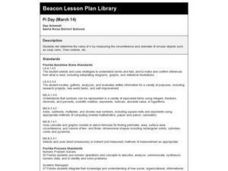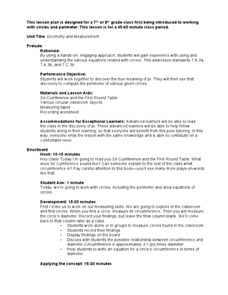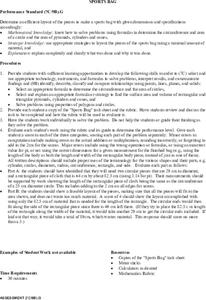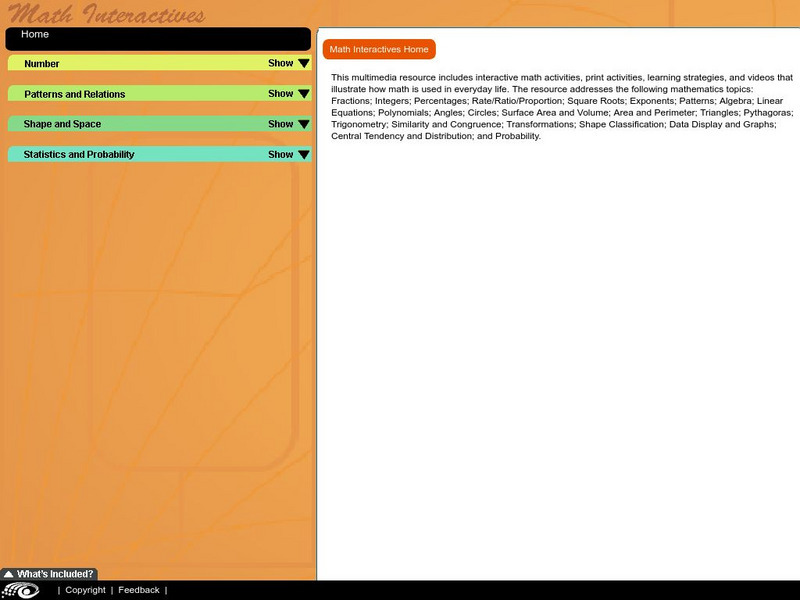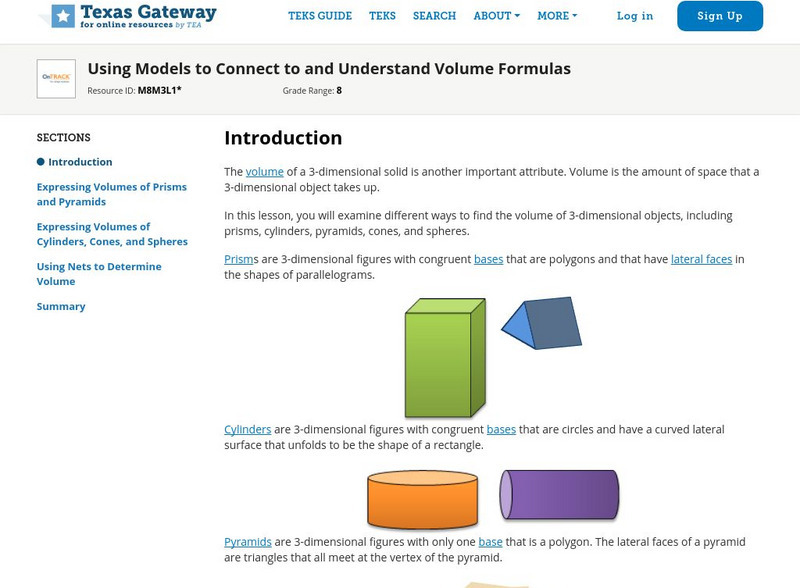American Museum of Natural History
Thinking in the Three Dimensions
Discover different dimensions with paper folding. Pupils first read about zero, one, two, and three dimensions, and then learn about the fourth dimension, time. They then use origami to create models of shapes in three dimensions and use...
Alabama Learning Exchange
It's Around There Somewhere! Perimeter, and Circumference
Explore the concept of building equations for perimeter and circumference. Learners use rulers to measure the perimeter of half a sheet of paper. Then fold the sheet of paper numerous times, each time measuring perimeter. Learners use...
Curated OER
Pi Day (March 14)
Fourth graders determine the value of ? by measuring the circumference and diameter of circular objects such as soup cans, Oreo cookies, etc..
Curated OER
Analyzing 3-D Shapes and 2-D Representations
Students can analyze 3-D objects better with actual physical models and by also drawing 2-D representations of them.
Alabama Learning Exchange
Pennies, Pennies and More Pennies
Learners determine the number of pennies needed to fill a room. For this pennies lesson plan, students work in groups to determine the number of pennies needed to fill a room. They compute the probability of the head of a pin landing...
Curated OER
Year Book Page Special Shape Collage
Students design a collage of pictures for a yearbook that make a shape. They determine the area of the shape and the price of putting the collage in the yearbook.
Curated OER
Worksheet 35 - Fall 1995
In this math worksheet, students sketch the graphs labeling the point of intersection in the first quadrant. Then they find the area of Ω.
Curated OER
Using Concept Maps to Design 3D Spheres
High schoolers create three dimensional shapes using concept maps. In this geometry lesson, students investigate the impact of mental schemas on humans. They collect data on this topic and plot their data on a coordinate plane.
Curated OER
Geometry Journal: Classifying Solids
In this geometry worksheet, 10th graders respond to journal prompts related to prisms and classifying solid shapes. The two page worksheet contains nine questions. Answers are included.
Curated OER
A Sphere and Its Net
Students identify and sketch the nets for sphere. In this geometry activity, students differentiate between two and three dimensional shapes. They find the surface area of each sphere.
Curated OER
Geometry and Measurement
Learners view a right triangle displayed by the teacher. Students measure legs and the interior angles of the triangle. They look for a pattern or relationship between the legs and angles. Learners use pegboards and string to create more...
Curated OER
Sports Bag
Students determine an efficient layout of the pattern pieces needed to make a sports bag with given dimensions and specifications. Given a word problem, data set and a diagram, students evaluate the information they have available and...
Other
Calculator.net: Volume Calculator
Use these calculator tools to find the volume, in your choice of units, of a sphere, cone, cube, cylinder, rectangular prism, capsule, ball cap, conical frustum, ellipsoid, or square pyramid. Includes a reference section listing formulas...
University of Regina (Canada)
University of Regina: Math Central: Surface Area to Volume Ratio
Students will investigate the relationship between surface area and volume and their application to the inner workings of real life organisms.
Government of Alberta
Learn Alberta: Math Interactives: Exploring Surface Area, Volume, and Nets
Investigate the concepts of area, volume, 3D shapes, and nets using this interactive Learn Alberta math. The solid shapes focused on this exploration include rectangular and triangular prisms, rectangular and triangular pyramids,...
Khan Academy
Khan Academy: Volume Formulas Review
Review the formulas for the volume of prisms, cylinders, pyramids, cones, and spheres.
Texas Education Agency
Texas Gateway: Using Models to Connect to and Understand Volume Formulas
[Accessible by TX Educators. Free Registration/Login Required] The student will use models to develop formulas and connect them to the volume of prisms, spheres, cylinders, pyramids, and cones.
Texas Education Agency
Texas Gateway: Using Models to Connect to and Understand Volume Formulas
[Accessible by TX Educators. Free Registration/Login Required] The student will use models to develop formulas and connect them to the volume of prisms, spheres, cylinders, pyramids, and cones.
Texas Education Agency
Texas Gateway: Determining the Surface Area and Volume of Composite Figures
Given a problem involving composite figures made from prisms, pyramids, spheres, cones, and/or cylinders, the student will find the surface area and volume of the composite figure.
CK-12 Foundation
Ck 12: Geometry: Pyramids and Cones Study Guide
[Free Registration/Login may be required to access all resource tools.] This study guide reviews the surface area and volume of pyramids and cones.
Houghton Mifflin Harcourt
Holt, Rinehart and Winston: Homework Help Independent Practice: Volume of Pyramids and Cones
Get independent practice working with the volumes of pyramids and Cones. Each incorrect response gets a text box explanation and another try. Correct responses are confirmed.
McGraw Hill
Glencoe Mathematics: Online Study Tools: Volume of Pyramids and Cones
This site gives a short interactive quiz which allows students to self-assess their understanding of the concept of finding the volume of pyramids and cones.
Math Open Reference
Math Open Reference: Cone
Use this interactive tool to explore cones. Change the height and the radius to see how these affect the cone. There is also the option of making an oblique cone. Properties of a cone are discussed, how to use formulas to calculate the...
Sophia Learning
Sophia: Volume of Pyramids & Cones
The mathematics resource includes material that explores the volume of pyramids and cones. Definitions, examples, and video lessons investigate the geometry concepts.




